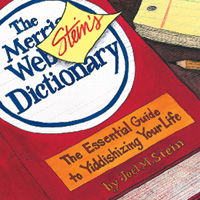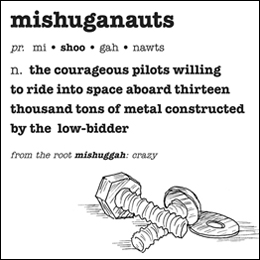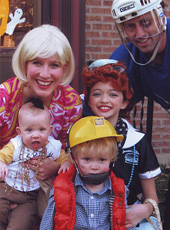Word Games
Permanent link All Posts

Webstein’s Dictionary: Yiddishizing your life, one word at a time
In October 2007, Joel Stein was sitting in the parking lot in Old Orchard, waiting. Alone in the car, he started to laugh — the word sadorachmonesism had popped into his head. Using the root word rachmones (pity, sympathy) he created a new noun:
sadorachmonesism
Defined as: the act of your mother telling you that you look “a little thick” in your new dress, then handing you her credit card to go buy something “more flattering.”
He thought the word would make a funny t-shirt and mentioned it to his friend Linda Cassidy, a designer who works for his family’s office furniture business — where he spends his workdays. “Linda said she thought I could come up with a whole book and these ideas just stated pouring out of me,” says Stein. Working on nights and weekends, and running ideas by his wife, Adele, and his friends, Stein came up with enough new words for a dictionary and returned to Cassidy for illustrations.
Stein’s interest in Yiddish comes from growing up on the North Shore with a father from Rogers Park. He says there was always little Yiddish being used at family gatherings. “My mom, who converted when she married my father, really picked it up. Yiddish is such a nuanced language and while I’m by no means a scholar, I appreciate that it’s very clever and conveys a very funny side of our culture,” Stein says.

An excerpt from Webstein’s Dictionary
Thinking in Yiddish
“Since I began writing the book, almost every Yiddish word is in my head. It’s funniest to me when non-Jews use Yiddish. It was the most influential language in the 20th century to American English — Spanish might be taking over now. People don’t always recognize that some expressions like, “Joe schmo,” are Yiddish.”
Stein himself had a funny moment with his non-Jewish sister-in-law and the phrase Bissell blower, n., root, bissell: a little, which Stein defines as: “a woman who tells the world of your lackluster performance in bed.”
“Right out loud in front of my Catholic in-laws she stopped at that one and said, ‘I don’t get it.’ I couldn’t have turned a brighter shade of red — it was a very funny moment,” Stein says.
Stein seems to enjoy a good double entndre and has a few more book ideas kicking around in his head, but he admits that Webstein’s Dictionary might be the most mainstream. “One is Erroritca, like the word error. It’s about things people think are hot and sexy, but really aren’t.”
For now, Stein is pleased with the response he’s gotten to Webstein’s and enjoying helping people Yiddish-ize their lives via the book and his blog. When he’s not thinking up new plays on words, he’s hanging out with his wife, three children and two dogs in Evanston.

The Yiddishizer himself, with his family on Halloween
You can find Webstein’s Dictionary at numerous locations around the city, including Spertus and online at Pop Judaica.



.jpg)



